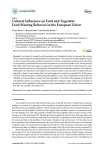Pelau C., Sarbu R., Serban D. (2020). Cultural influences on fruit and vegetable food-wasting behavior in the European Union. Sustainability, 10/11/2020, vol. 12, n. 22, p. 1-15.
https://doi.org/10.3390/su12229685
https://doi.org/10.3390/su12229685
| Titre : | Cultural influences on fruit and vegetable food-wasting behavior in the European Union (2020) |
| Auteurs : | C. Pelau ; R. Sarbu ; D. Serban |
| Type de document : | Article |
| Dans : | Sustainability (vol. 12, n. 22, November 2020) |
| Article en page(s) : | p. 1-15 |
| Langues : | Anglais |
| Langues du résumé : | Anglais |
| Catégories : |
Catégories principales 08 - ALIMENTATION ; 8.1 - Consommation Alimentaire. ComportementThésaurus IAMM GASPILLAGE ALIMENTAIRE ; FRUITS ET LEGUMES ; ALIMENTATION DURABLE ; SECURITE ALIMENTAIRE ; COMPORTEMENT DU CONSOMMATEUR ; PRATIQUE ALIMENTAIRE ; EVALUATION DE L'IMPACT ; FACTEUR CULTUREL ; PAYS DE L'UNION EUROPEENNE |
| Résumé : | In a context of increased world population and imbalanced access to resources, the concept of food waste has gained increased attention in the past years. The waste of food has a negative impact on the economy, the society and the environment. In order to reduce the quantities of wasted food, it is important to understand the factors and the situations in which food waste occurs. Several studies have shown that food waste happens mostly at the consumer level and that it is determined by a wide range of factors, such as socio-demographic characteristics and consumption patterns. The objective of this paper is to determine the impact of the national culture on the quantity of wasted fruit and vegetables. Based on secondary data, the panel regression analysis was applied for 28 European countries with the purpose of determining the influence of the cultural dimensions as described by Hofstede on the quantities of wasted fruit and vegetables. The results of the research show that the uncertainty avoidance of a culture complemented by the indulgence index influences the quantity of wasted fruit and vegetables, confirming that certain characteristics of the national culture are factors that affect the quantity of wasted food. |
| Cote : | En ligne |
| URL / DOI : | https://doi.org/10.3390/su12229685 |







